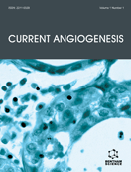Abstract
Glioblastoma Multiforme (GBM) is recognised as one of the most hypervascular human tumors. Various drugs have been developed that target pro-angiogenic factors in an attempt to disrupt the blood supply and thus arrest tumor growth. Clinical studies have largely been in groups of unselected patients and have encompassed both primary and recurrent GBM. Despite initial promise, in both pre-clinical models and preliminary clinical trials, sustained therapeutic benefit in the clinic has yet to be demonstrated. In this review article we present the most up to date clinical trials and aim to elucidate the common mechanisms by which GBM may be escaping these therapies. We also discuss other potential mechanisms of action and possible future indications for anti-angiogenic medication.
Keywords: Anti-angiogenesis, antibodies, clinical trials, glioblastoma, small molecule inhibitors, VEGF.
 20
20

